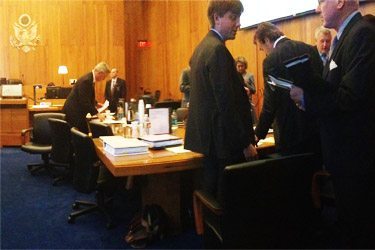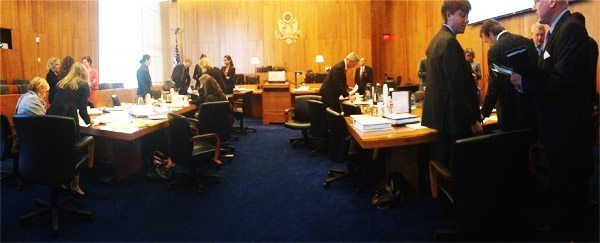Closing Arguments Heard in Texas Anti-Choice Law Trial
A federal judge said Wednesday that he would make a ruling on a lawsuit challenging parts of Texas' new omnibus anti-choice law "as quickly as [he] can," as the law is poised to go into effect next Tuesday.

A federal judge said Wednesday that he would make a ruling in a lawsuit challenging parts of Texas’ new omnibus anti-choice law “as quickly as [he] can,” as the law is poised to go into effect next Tuesday. Attorneys presented their closing arguments in the case Wednesday morning.
“For over 40 years, the Supreme Court has recognized that states may regulate abortion in order to protect women’s health, but it has also been clear that when a state does so, it has to actually protect women’s health rather than hinder it,” argued Janet Crepps, senior counsel with the Center for Reproductive Rights, which along with the American Civil Liberties Union and a coalition of Texas abortion providers has filed suit against the State of Texas in hopes of blocking two provisions of HB 2, the omnibus anti-choice law that Texas state Sen. Wendy Davis filibustered this summer as thousands of reproductive rights supporters descended on the state capitol in opposition to the law.
The plaintiffs are asking federal Judge Lee Yeakel to block certain provisions of HB 2, which require abortion providers to secure admitting privileges at hospitals within 30 miles of where they perform abortions and which mandate that medication abortions—the two-drug regimen of Mifeprex or mifepristone and misoprostol, branded as Cytotec—be prescribed by physicians strictly according to the 13-year-old Food and Drug Administration labeling, despite the fact that newer, more effective, and safer “evidence-based” protocols have been developed since the drug was approved in 2000. The plaintiffs argued that the medication abortion requirement would put Texans’ health at risk, and that the hospital admitting privileges requirement could shutter one-third of Texas’ existing abortion clinics as of next Tuesday if the law goes into effect.
State Attorney Andy Oldham argued the plaintiffs failed to establish that HB 2 places an “undue burden” on Texans who seek abortions, and noted what the attorney general’s office believes is the state’s interest in protecting “fetal life.”
“Because of the unique circumstances of abortion, the state is allowed to put regulations on the provision of abortion that it doesn’t necessarily extend to other things,” said Oldham. He also argued that because “history proves that the state has ample evidence to be skeptical of abortion providers,” the information provided by plaintiffs did not constitute ample evidence that the medication abortion provision of HB 2 would have a detrimental effect on Texas women.
As Judge Yeakel closed proceedings Wednesday, he told the court that “both sides raise strong issues.”
“I recognize the clock is ticking toward October 29,” said Yeakel. “I will get a final judgment out as quickly as I can get a final judgment out.”

